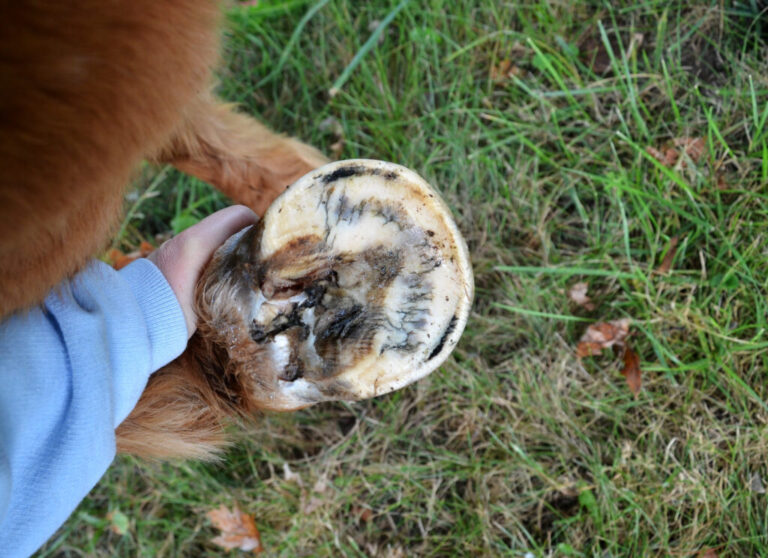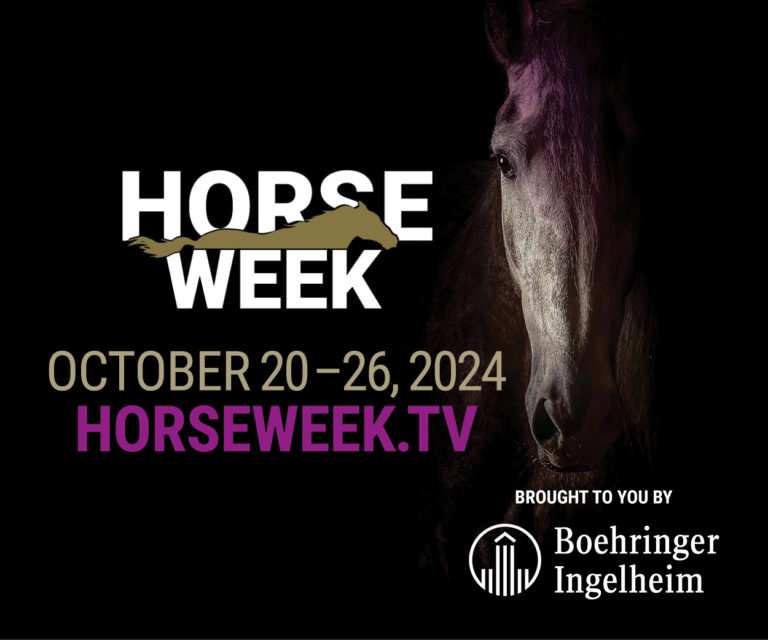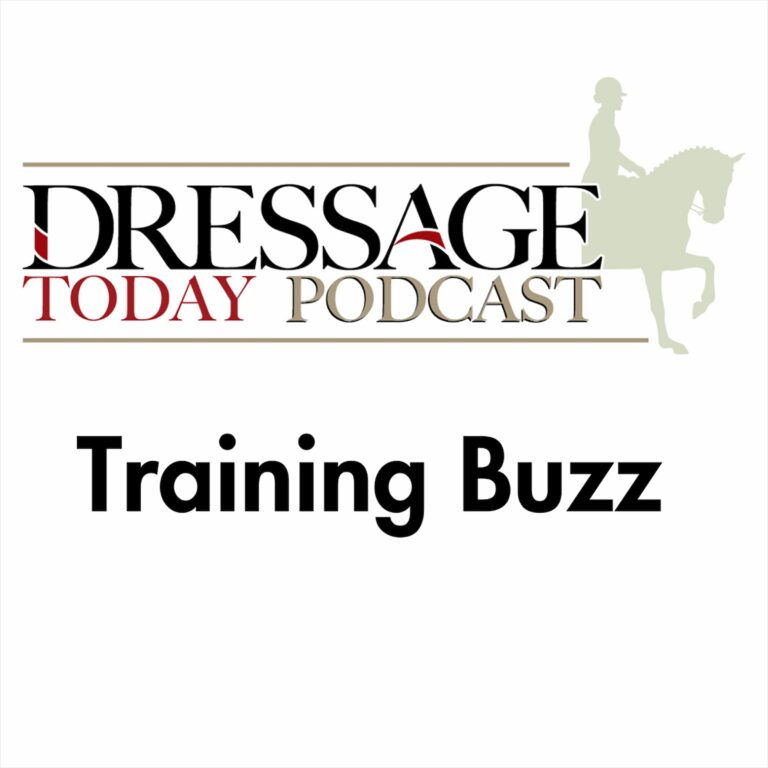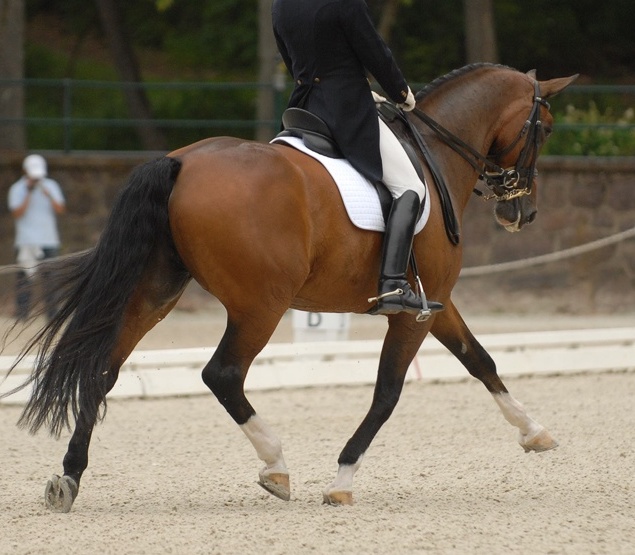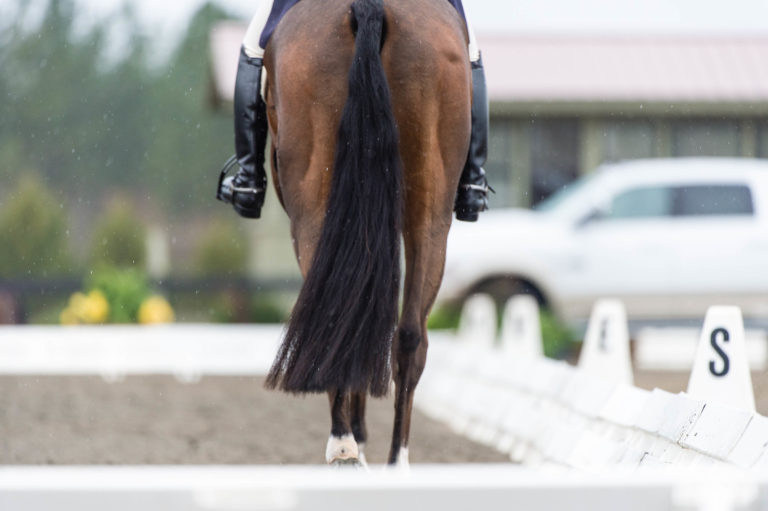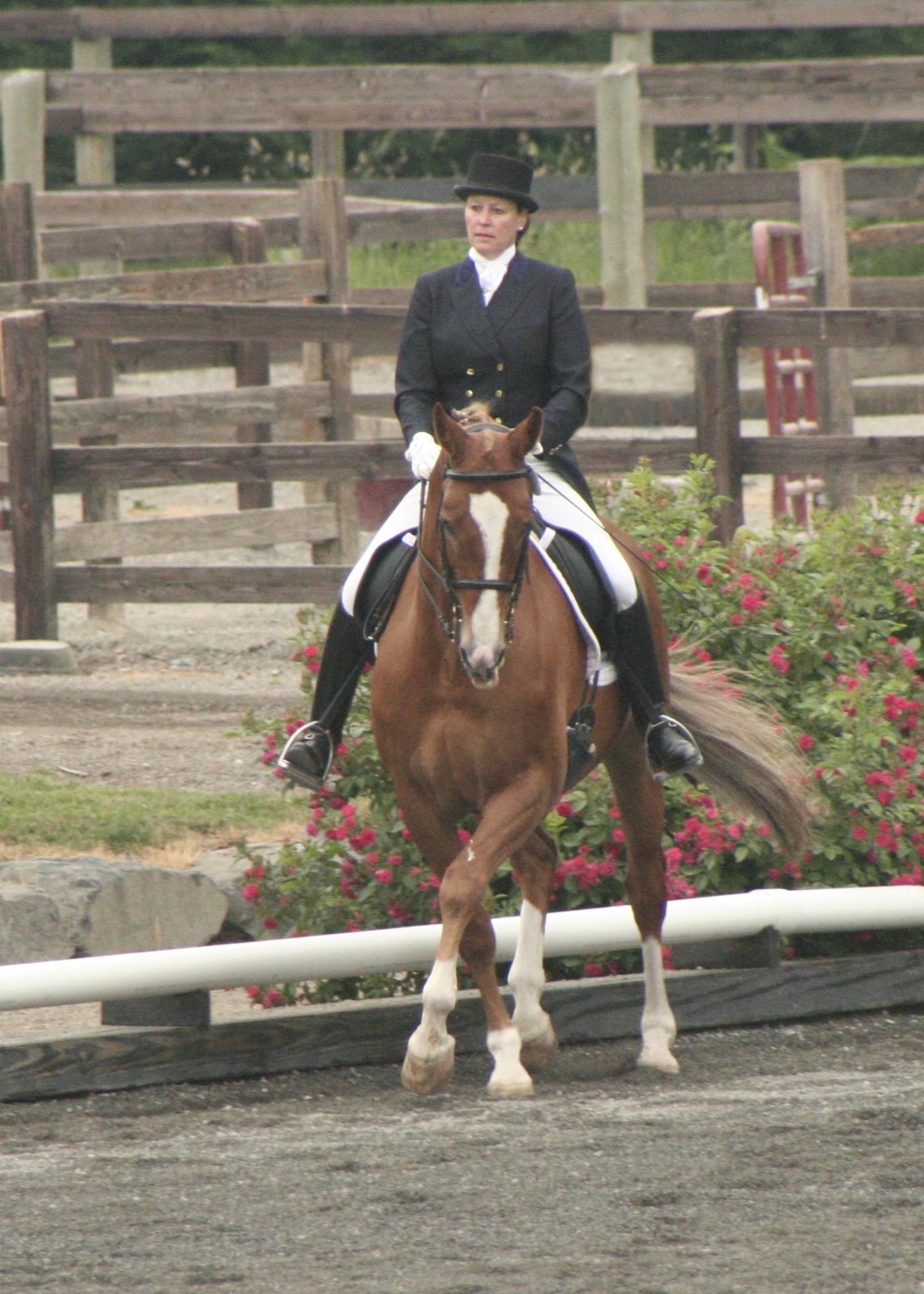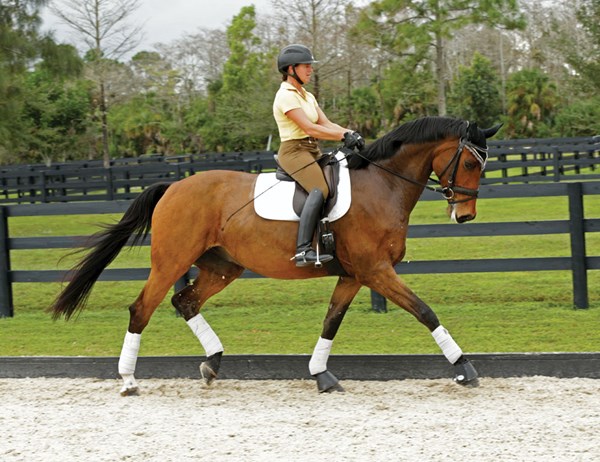Up-and-coming international rider Anna Marek and Fire Fly were named to the dressage short list for the horse-and-rider combinations traveling to Europe in hopes of making the Olympic team this past May. Marek and Fire Fly competed in early June at CDI Hagen, a 2024 U.S. Olympic dressage team observation event in Hagen, Germany. The pair earned top-12 finishes in the CDI4* Grand Prix and Grand Prix Special in a star-studded field.
Marek began showing and training dressage horses in 2001. With her Grand Prix horse, Unico, Marek rose to 12th in the nation during 2016. Last year, she claimed team gold and individual bronze with Fire Fly at the Pan American Games in Chile. In April 2024, she finished ninth—the highest-placed U.S. rider—with Fayvel at the FEI Dressage World CupTM Final in Saudi Arabia. She lives with her husband and two young children in Dunnellon, Florida.
Below is an excerpt from a recent Dressage Today podcast with Aviva Nebesky and Stephanie J. Ruff, (Episode 13, released May 28, 2024). Marek shares her experiences from the Pan American Games, FEI World Cup Finals and making the Olympic dressage short list.
All About Fire Fly
Q: Tell us about Fire Fly. What kind of a horse is he?
AM: He’s a 14-year-old Dutch Warmblood. I started riding him almost three years ago. He’d already shown Grand Prix, and his owner [Janet Simile] called me asking if I would take him in training.
When his owner brought him to me, he was nervous about a lot of things. He’s a very nervous type of horse, but not really spooky. He’s spooky if he gets nervous from the rider.
At the beginning of our relationship, he was really scared of the piaffe, and I said to his owner, “I know he’s shown Grand Prix, but for us to get him confident at this, he’s going to tell us when he’s ready to do it like a big boy and go back into Grand Prix and take that pressure.”
In January [2022], I showed him in an Intermediate II because I said to her, “I want to be able to keep the piaffes really forward, and I want to have less ones [tempi changes].” And he was great. Then, I took him to a little show, and I showed a Grand Prix, where I was like, “I don’t care what I get for the piaffe scores, I’m going to ride them really forward so that he’s not scared.” And then he was good, and slowly over time, I started to ask for a little bit more and if he’d tell me it was too much, I backed off. And then I’d kind of chip away at it again and ask for a little bit more as he trusted me.
Soon Anne [Gribbons, Marek’s trainer,] was like, “Let’s try a CDI.” And so, we did the last CDI in Wellington at the end of that season. The following year, every single show he kept getting better and better and better. And then we qualified and went to Pan Ams.

2023 Pan American Games
Q: How was it to win a team medal and an individual medal? And what was the entire environment surrounding that trip?
AM: That trip was awesome. Anne always drilled it into me before even any team stuff came up that when you are at a team event, the most important thing is to put in a good solid Grand Prix. When I was at one of the observation events at Lamplight, I didn’t really have any clean rides, and I didn’t ride my best. My dad, who’s a sportsman and is so into horses because I do what I do, watches. And he said to me, “Anna, you need to ride that test enough that you’re surprised if you make a mistake.” And that really sat with me.
After Lamplight, [Fire Fly’s] owner said, “You should go to [the World Equestrian Center] in two weeks. I know he’s traveled a long distance, but WEC is in your backyard, and it would be a good confidence builder for the two of you.” So, in those couple weeks, I rode the test three times at home just by myself and had it videoed so that I could go sit there and watch it.
Then the next show, I rode two clean tests. That was leading up to when I found out I was on the team and going to Chile. And I was really focusing on my precision, the details, and riding a clean test. I didn’t really let anything else get into my mind other than that. And then by golly, [at the Pan Am Games] we went into the Grand Prix, and we rode a clean test. I said to Anne, “My big goal was to ride a clean test to add to the score for the team and really prove that we belong there, we could do this, and we could handle the pressure.”
We had a mistake in the [Grand Prix] Special, but I was thinking to myself, “Well, you got nothing to lose now, so you better ride your butt off.” I ended up getting the same score in the Special as I did the Grand Prix because I rode better.
Then with the individual, which was the Freestyle, I was last to go. I will look back on it as one of the best feelings in my entire life because I didn’t expect to get an individual medal. And I was relaxed and I was like, “This is the fun part. I made it to the Freestyle.”
I went in and rode my test, and he was wonderful. So then, we’re standing at bit check, and it comes up on the board. I didn’t even see my score, I just saw the number three and I freaked out, screamed and spooked Fire Fly. My groom was like, “Just get off.” It was so funny, and it was such a happy time. I’ll never forget that, and all the team was going crazy.
Fayvel and the 2024 FEI Dressage World Cup Final
Q: Another big event you competed at was the FEI Dressage World Cup Final with Fayvel. How was that experience for you?
AM: Fayvel is a little bit of an easier horse than Fire Fly to ride in terms of his emotions. He’s a really solid citizen and competitor. He doesn’t have any baggage or anything like that. He and his owner [Cynthia Davila] did their first Grand Prix together. He’s really sweet. He’s very honest.
When Cynthia got hurt [she hurt her neck in a non-riding accident], she was like, “Well anything that you do with this horse and with showing him is only going to help me.” So, I started showing him at some national shows, and he did great. Cynthia said, “Why don’t you just try a CDI?” And so, that fall I did a CDI and I put him in the Freestyle.
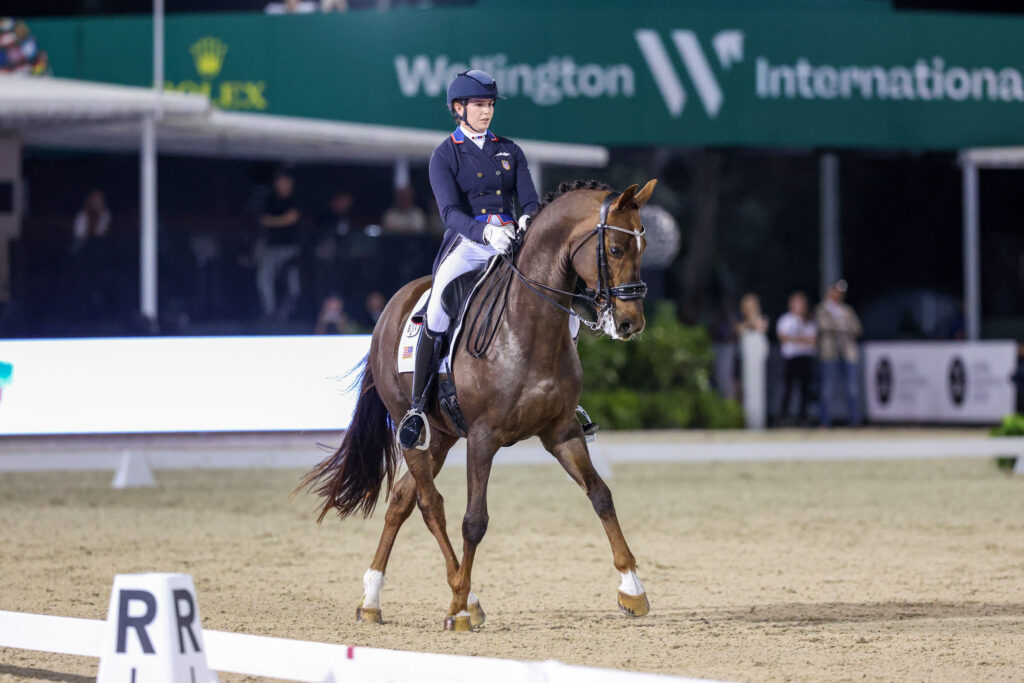
I used the freestyle that Cynthia had made for herself, which we created it as a green Grand Prix horse freestyle, meaning it didn’t really have any difficulty to it. It was cute music for him and everything. But we did that CDI. He did very well in the Grand Prix, and he did well in the freestyle. His owner said to Anne, “How good is this horse? Could he do something, and should Anna show him this year?” [They agreed that he was such a good horse that Anna should ride him.]
Anne said to Cynthia and her parents, “Well, if we’re really going to do this, Anna needs a difficult freestyle.” When I talked to [choreographer] Karen Robinson, who did his freestyle, I said, “Watching the European freestyles and the really tricky ones or the fun, crazy stuff that Isabell [Werth] does in the freestyle, this horse is super handy. He could do some difficult things.” And so, we created this freestyle where its difficulty level comes in at like a 9.9 if I complete everything and it’s not hard for him.
Every single time I rode him through the qualifiers, it got better and better and better until the end where he got a 77 at the first one, a 77 at the second to last one and a 78 at the last one. We easily qualified in three shows to go to World Cup.
We kind of went back and forth. Are we going to go? And then when he qualified, we all got really excited about it. And I was like, “Oh, of course we’re going” because my husband said the same thing. He was like, “This year, you need to not worry about [the family]. And you need to do everything that you can with these two horses because who knows when you’d have an opportunity like this and have two horses to do all these wonderful things on.”
One of my clients said to me, “Your kids are going to be proud of you one day and they’re going to be happy that you did all this and you’re setting an example for them.” That made me feel so much better.
Marek’s Training Philosophy
Q: Tell us a little bit about your training and your philosophy.
AM: I love that part of it. I love the training part. I still ride my baby horses after they get started. The wonderful thing about our sport is that no matter how much you’ve done or how old you are, there’s always more to learn. And so, the fun thing for me about bringing up the young horses is that they all teach you different things.
Mainly, my philosophy about the training is that dressage is teaching the horses to move away from pressure and dressage is strengthening and making the horse more balanced and more even. So, a lot of the exercises that I do with Fire Fly, Fayvel and my Grand Prix horses, I do the same with my 4-, 5-, and 6-year-olds. It’s just to a different degree.
With this kind of thinking, it’s believing that any one of my young horses is one day going to be a Grand Prix horse and going to ride with that evenness and ride with that precision and elasticity and suppleness. I never want them to feel like they’re forced to do anything. I want, even the Grand Prix horses, if they make a mistake to be able to laugh it off and go and try it again, because really the more pressure that you put on the horses, the worse that it is. You’re not teaching them anything from stress.
Training a lot of horses over time, the main thing is taking a little bit longer to teach them where they’re thinking and their understanding as opposed to “I know I can make this horse do a flying change.” I can just get it done, but I’m not teaching the horse anything. So, what if I took a little bit longer and then he really understands it and he does it out of relaxation. The point of dressage is that it’s beautiful and that the horses are relaxed and happy.
Thanks to Cosequin for our coverage of the 2024 Paris Olympics, including rider interviews, competition reports, horse spotlights, photos, videos and more.


